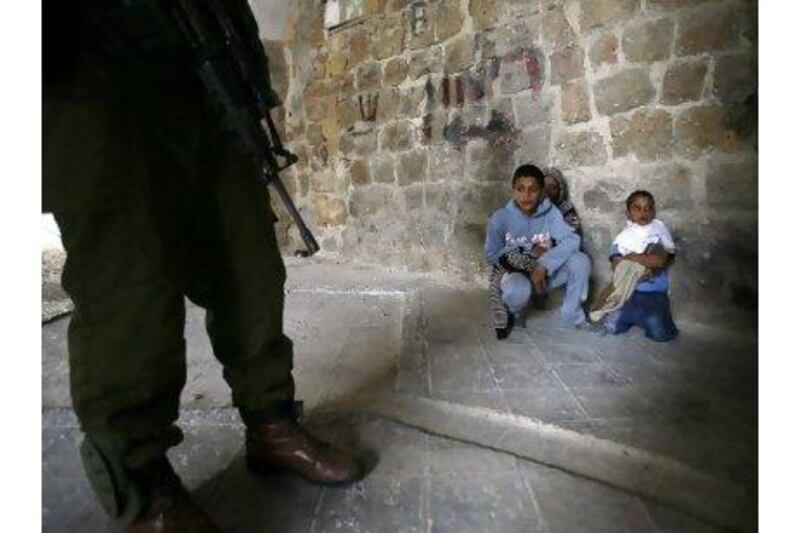BEIT UMMAR, WEST BANK // Military justice came to Sami on March 8 when two-dozen Israeli commandos raided his home shortly after midnight. The 15-year-old Palestinian's family watched as soldiers bound his hands, slipped over a blindfold and arrested him without offering an explanation.
Sami recounted in an interview how he was forced to walk three kilometres beyond his village, Beit Ummar, to a nearby Jewish settlement.
There, he said soldiers kicked him so hard that they bruised his ribs. At one point, he was seated on the floor ground between two sofas, which soldiers used as a vice to squeeze his rail-thin body.
"I tried to firm my body up to stop it. I couldn't breathe," said Sami, whose full name has been withheld at his family's request.
He said he was pressured to confess to throwing stones at settlers, for which he recently finished serving four months in Israeli prisons.
His experience is indicative of what rights groups are calling an alarmingly common ordeal for West Bank Palestinian children.
Palestinian minors caught up in Israel's military judicial system are described as enduring systematic abuse in two reports released this month by the Israeli watchdog of the occupied Palestinian territories, B'tselem, and Defence for Children International (DCI), a Geneva-based non-governmental organisation.
The reports say the system that has prevailed over West Bank Palestinians for more than four decades condones police intimidation of children, some as young as 9, in the form of physical and verbal assault, denying parental visitations, handing down harsh prison sentences and pressuring guilty confessions during violent, closed-door interrogation sessions.
In sworn testimonies of 45 children arrested during first half of this year, 39 complained of physical assault (slapping, kicking and punching) during their arrest, transfer or interrogation, DCI said in it report. In one of the report's testimonials, Ahmad, 16, who was arrested in April, recalls how an Israeli interrogator told him to confess, or else: "I'll open your arse in half".
Another boy named Mohammed, 15, describes how Israeli soldiers beat him along with a group children after their February arrest in the village of Bili'in. One soldier called them "sons of whores".
Although 28 out of the 45 children in the report were arrested for throwing stones, rights groups say they are unable to obtain precise information from Israel's military on arrests.
A "pattern of systematic ill-treatment emerges, much of which amounts to cruel, inhuman or degrading treatment or punishment", DCI concludes in its report, "In their own Words: A report on the situation facing Palestinian children detained in the Israeli military court system".
Israel's military judicial system has long been a lightning rod for criticism. While Palestinians are subjected to it, for example, critics point out that the West Bank's 300,000 Jewish settlers are tried under Israeli civil law.
More than 700 Palestinian minors a year are thought to pass through the military judicial system, though rights observers are unable to obtain precise details from Israel. Once incarcerated, they are considered security prisoners and are therefore denied access to phone calls and, in most cases, parental visits.
The system practically facilitates their imprisonment by offering military prosecutors great leeway in pressuring guilty confessions, according to B'tselem's report, "No Minor Matter".
Military judges usually order Palestinian minors to remain in custody throughout the proceedings.
"As a result, many minors prefer to enter into a plea bargain, in which they confess to the charges against them, fearing that, if a trial is held, they would be kept in jail during the long period of time that it takes to complete the trial," the report said.
The report said that between 2005 and 2010, 93 per cent of the 835 Palestinians who, aged 17 or younger, were arrested and prosecuted for stone throwing received sentences from a few days to as long as 20 months. Only one was acquitted.
Some of those jailed were younger than 14, even though imprisonment of children below that age inside Israel is prohibited, the report noted.
Israel's military, however, called B'tselem's report "unbalanced" and said its military judicial systems uses "great sensitivity" when it comes to minors.
"B'Tselem was made aware of 160 cases of stone throwing, including those involving minors, that resulted in the death and maiming of Israeli civilians and security forces," the military said in a statement, without providing details.
Even so, Umm Mahmoud, 34, who lives in Beit Ummar, fears her 9-year-old son, Mahmoud, may never overcome the trauma of February 18. That was when soldiers, pointing automatic weapons at his father, pulled Mahmoud from the family as he played in the front yard and took him to an undisclosed location for more than six hours.
They later found out he had been taken to a police station at Kiryat Arba, an Israeli settlement, where soldiers repeatedly slapped Mahmoud, she said. "They told him, 'if we see you throwing stones again, we'll take you away forever'."
They dropped off him at the Gush Etzion settlement later that night, never charging him with a crime, she said.
"I was worried Mahmoud would come back to me with a broken mind," she said. "He still has nightmares about soldiers coming to our home."





